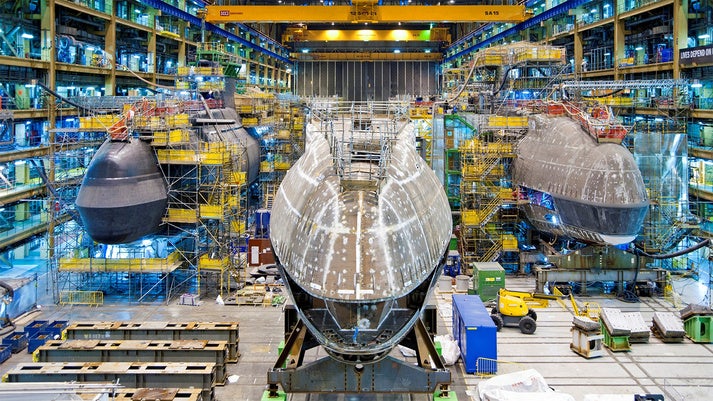
The MOD said it ‘immensely regretted’ wasting taxpayers’ money after mismanagement of nuclear infrastructure projects caused their cost to increase by £1.35bn and delays of between 1.7 and 6.3 years.
Chair of the Public Accounts Committee MP Meg Hillier said: “To utterly fail to learn from mistakes over decades, to spectacularly repeat the same mistakes at huge cost to the taxpayer – and at huge cost to confidence in our defence capabilities – is completely unacceptable. We see too often these same mistakes repeated.
“The department knows it can’t go on like this, it knows it must change and operate differently. The test now is to see how it will do that, and soon.”
According to the Committee, the MOD also said that the future cost of these nuclear infrastructure programmes could continue to increase as the design of the contracts mean the department, not contractors, are liable for financial risk. The committee added that little has been done to get contractors to improve their performance on the projects.
Responding to the report an MOD spokesperson told Army Technology: “The MOD is carefully examining the conclusions and recommendations set out in the PAC report and will respond formally in due course.
“Nuclear infrastructure projects are vastly complex and necessarily bespoke in design, but we continue to work closely with the regulators and our industry partners. Together, we are committed to strengthening the management of nuclear programmes, including significant investments in infrastructure to store and update weapons.”
How well do you really know your competitors?
Access the most comprehensive Company Profiles on the market, powered by GlobalData. Save hours of research. Gain competitive edge.

Thank you!
Your download email will arrive shortly
Not ready to buy yet? Download a free sample
We are confident about the unique quality of our Company Profiles. However, we want you to make the most beneficial decision for your business, so we offer a free sample that you can download by submitting the below form
By GlobalDataThe committee also criticised the MOD for failing to learn from 30 years of past mistakes that have been reported both by the PAC and the National Audit Office (NAO) and said that the MOD had not learned similar lessons from similar projects in the US.
The report reads: “The department’s nuclear infrastructure projects have suffered from major cost increases and delays. While we acknowledge the unique complexity and scale of these projects has contributed to costs escalation and this is common to other comparable programmes in other countries, UK cost overruns were caused in large part by avoidable mistakes, such as beginning construction work without mature designs.
“The three projects will not be delivered to the original plans, will be delayed by between 1.7 and 6.3 years, and will cost a total of £1.35bn more than originally planned. In particular, MENSA [a nuclear facility at Aldermaston] had seen a cost increase of £1.07bn.”
The report from the PAC highlights three projects with failings including BAE Systems in Barrow where facilities are being built to allow the modular manufacturing of the UK’s
Dreadnought submarines, a Rolls-Royce facility in Raynesway, and a project at a site in Burghfield.
Hillier added: “We expect the MoD to report to us later this year, in its 2020 update on the Dreadnought nuclear submarine programme, on how it is working with industry and other departments to develop and keep in place the skills it badly needs to take forward nuclear work.
“We also expect a detailed assessment of whether the current ownership arrangements for nuclear-regulated sites are in the best interests of the taxpayer to be provided to us by the end of this year.”
The reports summary reads: “The Ministry of Defence (the department) maintains a submarine-based nuclear deterrent, which relies on a network of programmes, equipment and people, including specialised infrastructure. Poor management of three on-going critical infrastructure projects on nuclear-regulated sites has contributed to a combined cost increase of £1.35 billion and delays of between 1.7 and 6.3 years. Each project suffered significant problems in its early stages and the department said it immensely regretted the amount of taxpayers’ money lost.
“It accepts that poor contracting had made it difficult to incentivise better performance from contractors and that it had not engaged effectively with the nuclear regulatory bodies. It also describes its arrangements for the [Defence] Nuclear Enterprise in the past as ‘fragmented and balkanised’, with insufficient recognition of the interdependencies between projects.”
The summary added that while the MOD had negotiated changes to some infrastructure contracts to reduce its financial risk and had made some improvements to its nuclear enterprise, the MOD still ‘has shortages of the specialist skills it needs.’ to better manage the programmes.
PAC’s recommendations
Concluding the report, the PAC made some recommendations to the MOD, to prevent future infrastructure problems having similar overruns in terms of cost and delays. The PAC said: “In the future, the department must more explicitly identify and manage the risks of initiating infrastructure projects without a fully mature programme design, and plan using appropriate checkpoints within contracts to assess progress.”
The PAC added that the MOD should update Parliament in its 2020 Dreadnought report on how it is using single-source regulations, and ensure that it works to effectively share risks with site owners when negotiating contracts.
The report added that it recommends the MOD looks to ring-fence the nuclear budget as part of the now delayed Integrated Review of Defence and Foreign policy. On top of this, it recommended that: “To secure performance improvements across infrastructure programmes, the department must continue the commendable practice of admitting failures early and learning from its mistakes.
“We expect to see as standard more robust liaison arrangements between the department, site owners and regulators, including the use of co-location of teams, consistent with practice in the civil sector to accelerate the process of reviewing and learning.”
Other conclusions say the MOD should make sure that when it signs contracts the purported transfer risk to the private sector is not ‘illusory’. It added that future contracts should be explicit about project risks, and how they can be managed by both the MOD and contractors.







